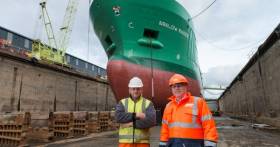Displaying items by tag: Swansea Drydocks Ltd
Closed Dublin Dry Dock Leads to New Business At Recently Upgraded South Wales Facility
#DryDockYards - Following closure of Dublin Graving Docks last year, the main client Arklow Shipping, has been forced to send some short-sea traders elsewhere, which has involved use of the recently refurbished Swansea Drydocks Ltd in south Wales, writes Jehan Ashmore.
According to SDL, Arklow Raider had the honour as the first cargoship to use the extensively upgraded facility which was taken over by the company. The 4,933dwt cargoship dating to 2007 belongs to a combined 50-plus mixed flagged fleet under the Irish and Dutch flags respectively. The latter flagged fleet are managed by ASN B.V. of Rotterdam.
The dry docking period of the Irish flagged Arklow Raider was first noted by Afloat last month when the near 90m cargoship had occupied the larger Prince of Wales dock (no.1) which is at 204.5m in length. This dry dock though is smaller when compared to what the Dublin facility had to offer with the 220m dry dock. The facility which used to have two dry docks, closed last year though an exception was made earlier this year to facilitate a much needed overhaul of the timber built tallship, Jeanie Johnston.
The second dry dock in Swansea at 170m is adjacent within the King's Dock system of three basins from where the facility is accessed through a lock from the port's channel leading to the River Tawe. Located close to where the loch entrance is where Fastline Line had operated the last Swansea-Cork ferry service until 2011. The Irish owned company had operated from the terminal built originally for the B+I Line that was served by ferries, among them the Connacht (built 1978), see related report.
Commenting to Afloat on the major investment, Garth Masterson, G.M., Swansea Drydocks Ltd said "the work involved bringing the 2 drydocks back to there full working potential.Since the take over we have refurbished no 1 drydock caisson with all new sealing timbers which enabled us to start drydocking vessels in the last few months, we are now in the process of renewing steel to no 2 gates and getting workshops ready".
The port of Swansea operated by Associated British Ports (ABP) has a long history of ship repair that dates back to the early 20th century. The reopening of the business by SDL saw a long term lease signed with ABP and this will utilisise the port’s geographical position to dry dock vessels up to 35,000 dwt and primarily operating in northern European waters. This trading area is particular covered by Arklow Shipping.
In addition SDL offers a complete lifecycle service that includes surveys, ongoing maintenance, repairs, and the recycling of end of life vessels which has Afloat will have more to report on.
Upon completion of works of the Arklow Raider, the short-sea trader sailed across the Bristol Channel to Portbury (Port of Bristol). From there a passage on the Celtic Sea was made with Afloat tracking the ship's arrival off Cork Harbour at the end of the same month. The cargoship then made a coastal passage to Limerick Docks where Afloat also noted on Monday this week another R class, Arklow Raven also share the Ted Russell Docks close to the city-centre's main throroughfare O'Connell Street.
Also down the estuary anchored close to the Mouth of the Shannon were further ASL Irish flagged ships but of differing F and M classes represented by Arklow Falcon and bulk carrier Arklow Manor.
Also tracked by Afloat on Monday, was yet another R class sister, the Dutch flagged Arklow Rally that was at SDL's Prince of Wales No.2 dry dock. The cargoship is only one of two dating to 2002 and as such are the oldest tonnage in the entire fleet. It was noted the following day that a name change had taken place to Celtic Freedom and transfer to the UK flag. Afloat will have more to report on this development.
As of this morning, further tracking again focusing on Swansea noted that Arklow Raider departed Limerick and had returned to the Welsh port.





























































